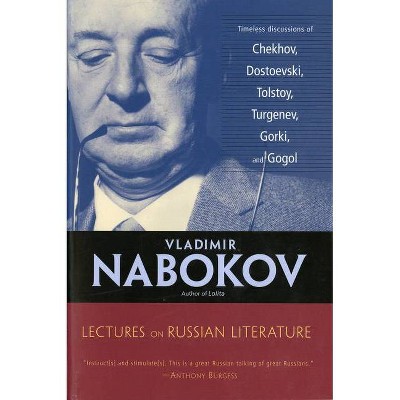Representing the Marginal Woman in Nineteenth-Century Russian Literature - (Contributions in Women's Studies) by Svetlana Slavskaya Grenier

About this item
Highlights
- Gender-oriented studies of 19th-century Russian literature have struggled with how to determine the feminism or misogyny of particular authors.
- About the Author: SVETLANA SLAVSKAYA GRENIER is Assistant Professor of Russian at Georgetown University.
- 192 Pages
- Literary Criticism, Russian + Former Soviet Union
- Series Name: Contributions in Women's Studies
Description
About the Book
Gender-oriented studies of 19th-century Russian literature have struggled with how to determine the feminism or misogyny of particular authors. This book argues that in order to make this determination, we need to engage with the poetics of the text rather than rely on the author's stated views. By focusing on the character type of the ward, or young female dependent, this book examines the narrative strategies used by such writers as Pushkin, Zhukova, Tolstoy, Herzen, and Dostoevsky to represent socially marginal women in their works.
Drawing on the theories of Bakhtin, the volume analyzes the degree to which female characters are presented as subjects who actively think and perceive, rather than as passive objects who are thought of and perceived by men. In a polyphonic novel, authors enter into dialogic relationships with their characters; they depict them as unfinalizable persons, unfathomable and unpredictable, capable of the full range of human activity and emotion. The extent to which this polyphony incorporates women's voices is an accurate gauge of the feminism or misogyny of individual writers.
Book Synopsis
Gender-oriented studies of 19th-century Russian literature have struggled with how to determine the feminism or misogyny of particular authors. This book argues that in order to make this determination, we need to engage with the poetics of the text rather than rely on the author's stated views. By focusing on the character type of the ward, or young female dependent, this book examines the narrative strategies used by such writers as Pushkin, Zhukova, Tolstoy, Herzen, and Dostoevsky to represent socially marginal women in their works.
Drawing on the theories of Bakhtin, the volume analyzes the degree to which female characters are presented as subjects who actively think and perceive, rather than as passive objects who are thought of and perceived by men. In a polyphonic novel, authors enter into dialogic relationships with their characters; they depict them as unfinalizable persons, unfathomable and unpredictable, capable of the full range of human activity and emotion. The extent to which this polyphony incorporates women's voices is an accurate gauge of the feminism or misogyny of individual writers.Review Quotes
?[S]vetlana Grenier is to be congratulated for producing an important contribution to our understanding of nineteenth-century Russian literature and especially the role therein of marginalized women.?-The Russian Review
?Grenier's monograph will prove to be indispensable to both feminist and Bahktinian scholars. Her systematic approach of presenting questions and answers lays the groundwork for further readings of this kind. Highly readable and easy to navigate, it also offers novel ways of interpreting classical Russian literature.?-Slavic and East European Journal
?This book has many strengths: its close attention to nuances of voice and point of view is often insightful; bringing together this series of texts and characters provides illuminating moments of contrast.?-Slavic Review
"ÝS¨vetlana Grenier is to be congratulated for producing an important contribution to our understanding of nineteenth-century Russian literature and especially the role therein of marginalized women."-The Russian Review
"[S]vetlana Grenier is to be congratulated for producing an important contribution to our understanding of nineteenth-century Russian literature and especially the role therein of marginalized women."-The Russian Review
"This book has many strengths: its close attention to nuances of voice and point of view is often insightful; bringing together this series of texts and characters provides illuminating moments of contrast."-Slavic Review
"Grenier's monograph will prove to be indispensable to both feminist and Bahktinian scholars. Her systematic approach of presenting questions and answers lays the groundwork for further readings of this kind. Highly readable and easy to navigate, it also offers novel ways of interpreting classical Russian literature."-Slavic and East European Journal
About the Author
SVETLANA SLAVSKAYA GRENIER is Assistant Professor of Russian at Georgetown University. Her articles have appeared in such journals as Russian Literature, New Zealand Slavonic Journal, Canadian Slavonic Papers, and Slavic and East European Journal.










